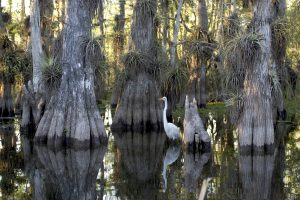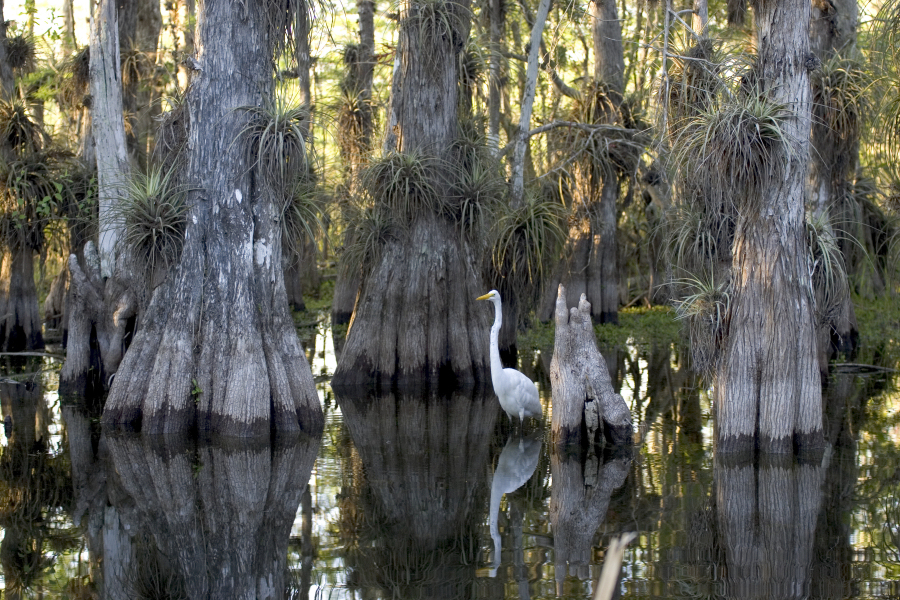4 Reasons Everyone Should Care / About America’s Everglades
It’s been called one of the world’s great biological wonders.
And since there’s nothing quite like Everglades National Park, efforts have been made for decades to protect and preserve its fragile ecosystem.
But just how well protected the park is can be confusing, especially with two recent events that seem at odds. An appeals court ruling could pave the way for oil drilling in at least one part of the 1.5 million-acre park. Meanwhile, Florida Gov. Ron DeSantis recently proposed spending $360 million for Everglades restoration projects.
Regardless of such conservation contradictions, there’s no denying that the Everglades is a national environmental treasure, though a swampy one that many people haven’t explored up close and personal.
“Even people in Florida don’t always realize what they have here, much less people elsewhere in the country,” says Clyde Butcher (www.clydebutcher.com), a nature photographer who since the 1980s has helped bring national attention to the Everglades through stunning black-and-white photographs that have been compared to the works of Ansel Adams.
“People just don’t realize how unique and beautiful the Everglades are. When I first moved from California to Florida in 1979, I didn’t either. Now I’ve fallen in love with a swamp.”
Butcher over the years has dared to wade into regions of the Everglades that most people never see. He’s making plans to put his latest photographic exhibit, “America’s Everglades: Through the Lens of Clyde Butcher,” on a national tour. Right now the exhibit is on display through May 26 at the Appleton Museum in Ocala, FL, and in 2020 will be in Youngstown, Ohio.
Butcher has photographed other locations, but it is the Everglades that became his greatest subject. He suggests 4 reasons why everyone, whether they live in Florida, Ohio or Oregon, should care about this natural wonder:
- The uniqueness. Unlike rivers, lakes and mountains, there is no other Everglades. The planet has just one to care for. “There is no other place on earth like the Everglades,” Butcher says. “It’s beautiful in its primeval essence.”
- The need for clean water. Everyone can identify with the need for fresh, clean water to support life. By saving the Everglades we save the water, Butcher says, and by saving the water, we save ourselves. “If we don’t clean the water, our own drinking water will fail, thus destroying the economy of both coasts of Florida,” he says.
- The impact on the ocean. Saving the Everglades also helps save the fish nurseries along the coast, and thus saves the ocean.
- The example that will be set. By saving the Everglades, Butcher says, we can show the world that we can save a precious environment and give other communities and countries the inspiration to do the same. As Marjory Stoneman Douglas, author of the book The Everglades: River of Grass, said, “If we can save the Everglades we can save the world.”
Butcher says everyone can help make the world a better place, by speaking up for places that are wild and endangered; by volunteering in state and local parks; and by personal choices related to how we treat nature.
For Butcher, photography is his contribution.
“Through my images,” he says, “I hope people will come to a greater understanding of the beauty they will lose if the preservation and restoration of our environment is not in the forefront of our thoughts.”
Clyde Butcher (www.clydebutcher.com) is an acclaimed nature photographer who is best known for his striking black-and-white images of the Everglades in Florida. But he has photographed the beauty of nature in other locations as well. For more than 50 years, he has been preserving on film the untouched areas of the landscape. Butcher has been honored by the state of Florida with the Artist Hall of Fame Award. Other major awards and honors include the Lifetime Achievement Award from the North American Nature Photography Association; Humanitarian of the Year for 2005 from the International University; the 2011 Distinguished Artist Award from the Florida House in Washington, D.C.; and the Ansel Adams Conservation Award from the Sierra Club.
[livemarket market_name="KONK Life LiveMarket" limit=3 category=“” show_signup=0 show_more=0]





No Comment